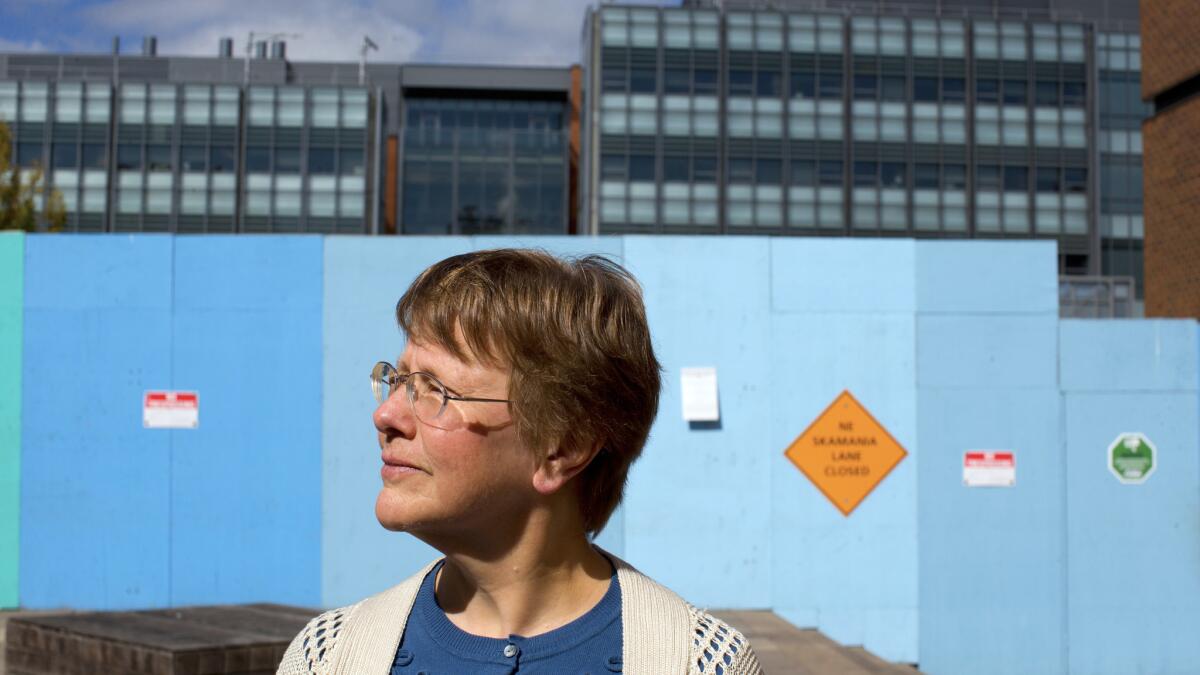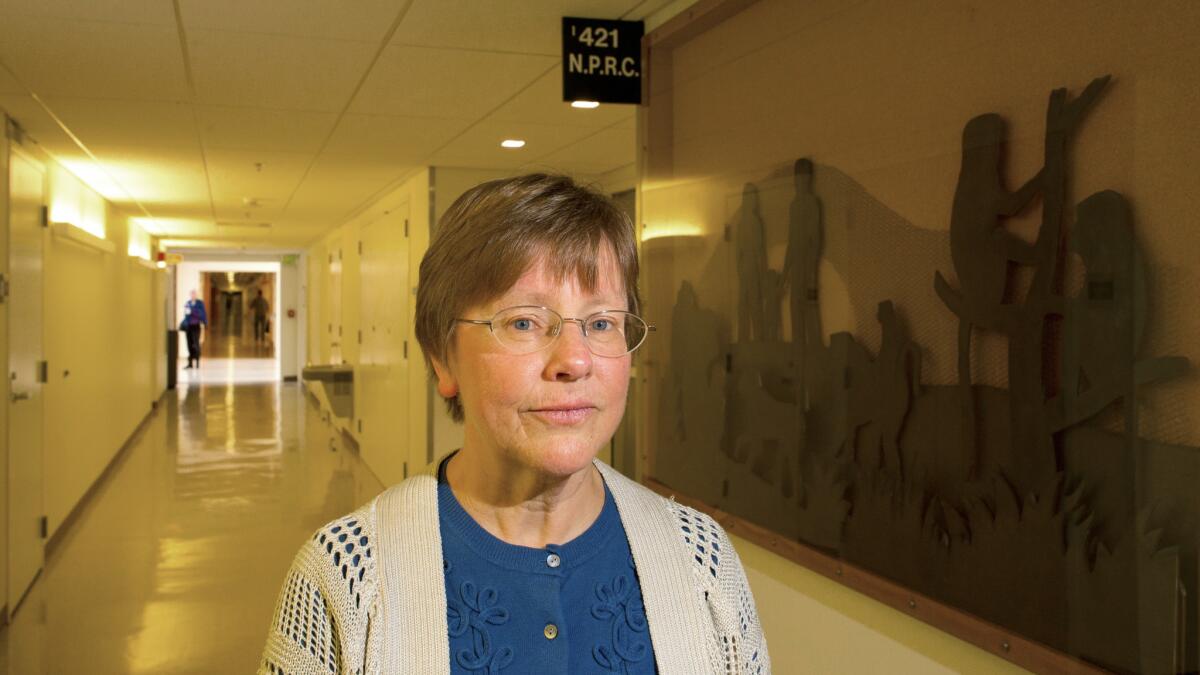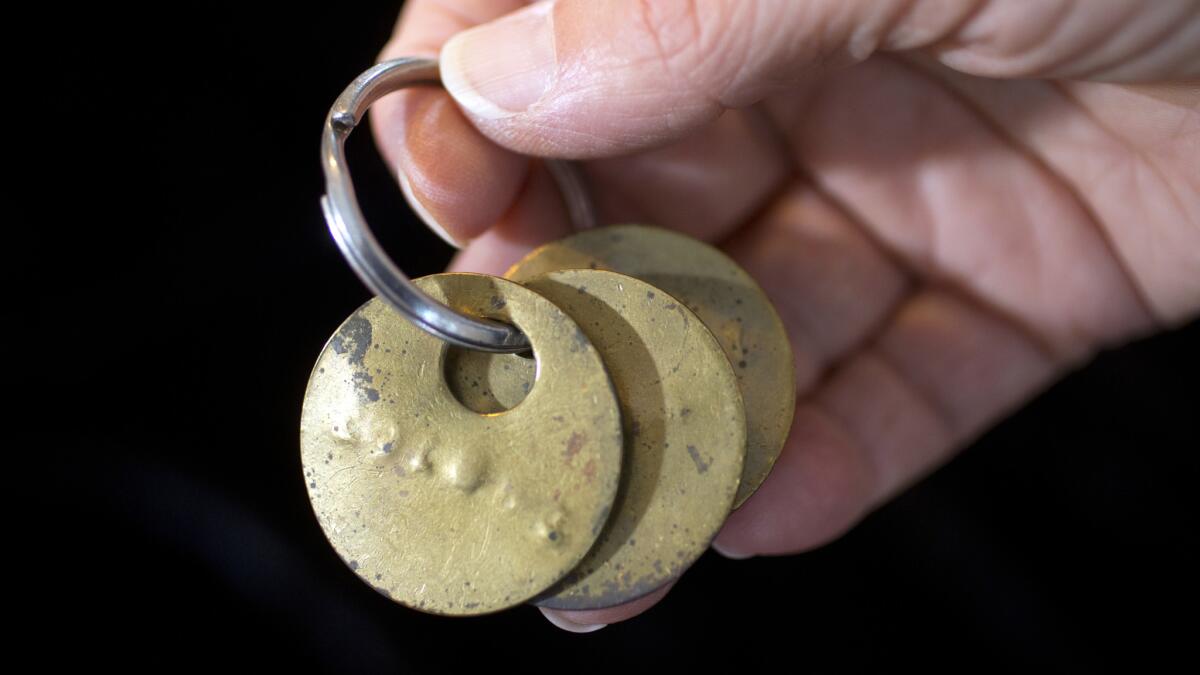How one scientist came to defend animals used in research

- Share via
Reporting from seattle — Kathy Bentson keeps the brass ID tags in a small table inside her front door. They belonged to research subjects at the University of Washington, two monkeys that died and one that survived.
The tags are a reminder that her work is not done, that she has not published data showing the monkeys endured more pain and distress than they should have as subjects in medical studies.
As the University of Washington builds a controversial, $124-million animal research and care facility, this former UW researcher says school officials have suppressed her data showing that some categories of monkeys used in its studies exhibited dramatically high levels of disturbing behavior not seen in the wild.
The mild-mannered 62-year-old with a doctorate in neurobiology and behavior is no fiery animal rights activist. But Bentson has found the last decade to be a struggle between emotion and intellect. Animal welfare and animal research. Conscience and career.
Such debates, both internal and public, are taking place throughout the scientific community. In 2011, the National Institutes of Health concluded that most research conducted with chimpanzees was unnecessary — that chimps, as humans’ closest relatives, merited “special consideration and respect.” Last year, the NIH said its remaining 50 research chimps would live out their days at a sanctuary.
Bentson says using animals as research subjects is sometimes necessary.
“I would likely be dead, and you might too without it,” she said. “It prolongs and improves the quality of life for humans and animals.”
There were two main conclusions in Bentson’s original manuscript: If a monkey exhibited “floating limb suite,” which causes its legs to contort, it was more likely to bite itself. And such behavior occurred in levels that vary by species, sex and whether the monkey was raised in a nursery or by its mother.
Taken together, the data showed that it was possible to know which monkeys would be more resilient during medical research, and therefore, it was largely possible to avoid using monkeys that would suffer more.
Bentson and her colleagues at the Washington National Primate Research Center published half of the results in the American Journal of Primatology, in a 2010 article that showed a relationship between floating limb behavior and self-biting. The UW has quashed the second part of the study’s conclusions, Bentson said.

University officials describe the data in question as sloppily gathered and out of date. They say Bentson’s colleagues found her manner unprofessional.
Tina Mankowski, UW Medicine’s associate vice president for medical affairs, said Bentson “was insistent on her point of view that others did not share.”
Bentson is a scientist who believes in the limits of data. She is loath to use the word “suffering” when describing the animals she has studied so closely. It is subjective, a layman’s term, an unsupportable leap into monkeys’ minds. “Distress,” she said, over and over, is the better word.
Only after years of fighting with the university and hours of interviews did the word spring unbidden — in an email to a reporter in which she described the impact of non-human primates on her very human heart.
“Imagine being tasked with spending 5 years looking for ways to predict and reduce the incidence of severe abnormal behaviors in laboratory monkeys,” she wrote. She thought it would be tough work, and it was. “I compartmentalized, as most people who deal with suffering do.”
But she was quick to continue: “Any ways they affected me did not in any way influence my careful recording of behaviors based on definitions.”
Bentson’s journey to the primate research center began while growing up in rural Gunnison, Colo., where she would ride her bike to a hidden place she called paradise, a pond choked with low-lying foliage. She would get down on her knees and watch a changing world up close. Frogs. Bugs. Dragonflies.
“It was the first time,” Bentson said, that “I learned how much joy you can derive and how much you can learn just by being an observer.”
Twenty-five years later, Bentson was accepted into the University of Washington’s doctoral program in neurobiology and behavior and met her first monkey.
Working with the UW bioengineering department, she helped develop a means of collecting blood samples by remote control from a group of freely moving baboons at the primate center.
The samples let Bentson measure stress hormones, and the result was a dissertation on how physiological changes varied by a baboon’s rank in its group. Two years of post-doctoral work at UC Davis followed, and then Bentson returned to Seattle.
That’s where Carolyn Crockett, head of the psychological well-being program at UW’s primate research center, invited her to create a research project.
Together they received an NIH grant, $750,000 over five years for a study called “Predicting and reducing severe behavior disorders in laboratory monkeys.”
The primary goal, Bentson said, was “to improve the well-being of monkeys that are used in medical research.”
The investigators defined behaviors that were abnormal and collected data showing which monkeys exhibited them. Their ensuing manuscript was based on three years of data collected from 1,117 macaques involved in medical research.
For another part of the study, Bentson observed a group of monkeys for eight minutes at a time. Many of the monkeys were used in infectious disease research. Bentson was required to wear protective gear from head to toe.
“I couldn’t talk to them or touch them or give them food,” she said. “The ones I knew about and cared about very much had a lot of problems. That was my job — to deal with the ones that had problems.”
As she watched the monkeys bite themselves or pace or contort their legs, Bentson would remind herself that she could not help the animals in front of her. But “the way I could help more monkeys, is to write up our results in peer-reviewed journals.”
She remained objective, she said, but she was especially touched by a female macaque she figured out later had been taken from its mother and partially reared in a nursery.
When Bentson began observing that monkey, the macaque was “full of life” and would acknowledge her with a greeting unique to pigtail macaques — lips forward, ears back, neck extended.
“I could never return that greeting,” Bentson said. “The only part of my face she could see was my eyes, and I was the neutral observer.”
Over time, Bentson began to worry about the monkey. The macaque’s coat looked greasy, and she appeared quite weak. All in addition to biting herself and contorting her limbs.
“After I observed her one day, I went down to my desk,” Bentson recalled, the macaque’s ID tag in her hand, her eyes welling with tears. “I put my head down, and I cried.”
The monkey eventually had to be euthanized. Her pulmonary artery was blocked. She had pneumonia. It was almost impossible for her to breathe.

Bentson said her work suggests the university was using monkeys that were more likely to show signs of distress in captivity for research at the time of the study.
In the past 18 months, Bentson has reached out to University of Washington President Ana Mari Cauce for help getting the remaining research published, but to no avail. She has hired an attorney, but says she has no plans to sue. Bentson decided to go public, she said, hoping that Cauce would reconsider.
A draft manuscript “Ms. Bentson claims is being ‘suppressed’ is based on data the Primate Center has determined unreliable,” Jane Yung, a Washington state assistant attorney general, wrote in a letter to Bentson’s attorney.
“These data do not meet accepted standards for data collection both in the experimental design,” Yung continued, “as well as concerns due to her pressuring observers to alter their findings.”
Bentson countered that the data in question came from the same study, using the same methodologies as the 2010 published article.
“I am a scientist who was driven to conduct research with tremendous personal integrity,” she continued. “I had no vested interest in ‘pressuring observers to alter their findings.’ ”
Her goal, Bentson said, is not to embarrass the university, which has been the focus of ongoing protests by animal rights activists who want to block construction of the underground laboratory.
The scientist, who lives in a small, book-lined Seattle apartment with her cats, Meghan and Lucy, will not join forces with the campaign against the center. All she wants, she said, is to help improve the lives of animals involved in important medical research — by publishing her results in a peer-reviewed journal.
Crockett, her former supervisor who has since retired from the university, declined via email to comment but wrote: “Owing to some actions of Kathy Bentson with which I strongly disagree, I terminated contact with her some time ago.”
These days, Bentson teaches physiology and anatomy at Everett Community College. She expects she will never be able to work as a research scientist again.
“You understand, I’m burning all my bridges with my research community,” she said. But “I refuse to be this silent person anymore.”
She made a promise to the monkeys. And she wants to keep it.
ALSO
Anti-Trump protests continue in large cities across the nation
Climate change is real: Just ask the Pentagon
Former soldiers say California Guard never paid bonuses it promised to interpreters in war zones
More to Read
Sign up for Essential California
The most important California stories and recommendations in your inbox every morning.
You may occasionally receive promotional content from the Los Angeles Times.











